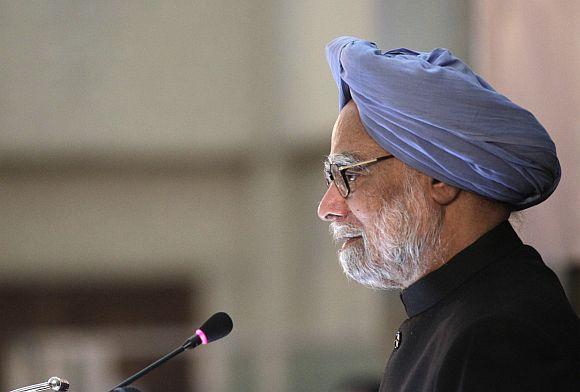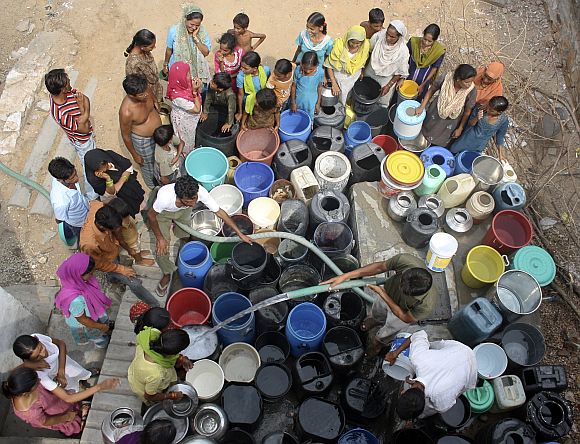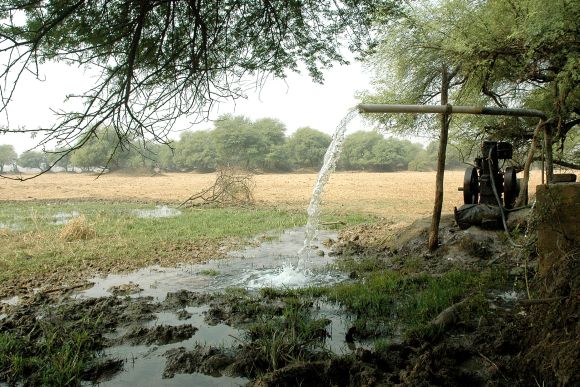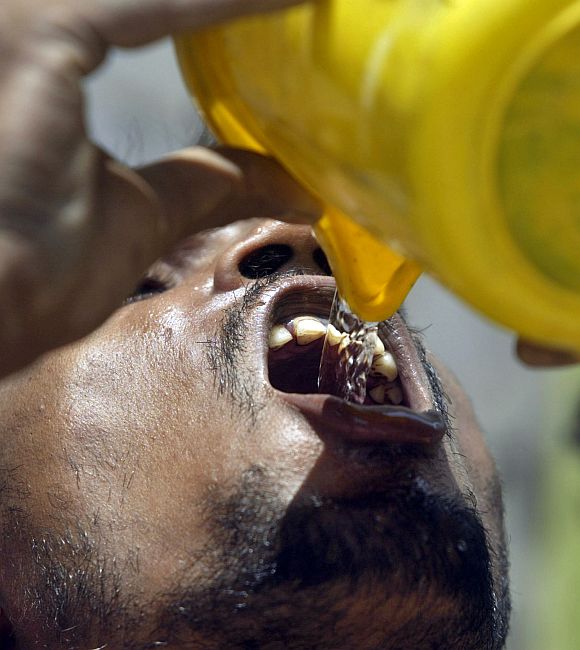Photographs: Andrew Biraj/Reuters
Following is the text of Prime Minister Manmohan Singh's address at the inaugural ceremony of India Water Week, in New Delhi on Tuesday.
With around 17 per cent of the world's population but only 4 per cent of its usable fresh water, India has a scarcity of water. Rapid economic growth and urbanisation are widening the demand supply gap. Climate change could further aggravate the availability of water in the country as it threatens the water cycle.
Our water bodies are getting increasingly polluted by untreated industrial effluents and sewage. Groundwater levels are falling in many parts due to excess drawals leading to contamination with fluoride, arsenic and other chemicals. The practice of open defecation, which regrettably is all too widespread, contributes to contaminating potable water sources.
The Planning Commission has identified the challenge of managing our water resources in a rational and sustainable manner as one of the critical challenges in the twelfth five year plan. It will require action on many fronts and coordination across different sectors of our economy.
Please ...
'Mission to achieve equitable distribution of water'
Image: Residents fill their containers with drinking water from a water tanker provided by the Rajasthan government in JaipurPhotographs: Parivartan Sharma/Reuters
We have launched a National Water Mission as part of our action plan on climate change. The main objective of this mission is to achieve integrated management of water resources by conserving water, minimising wastage and ensuring its more equitable distribution both across and within various states of our Union.
The mission proposed a review of the National Water Policy and a draft of the new policy has been put in the public domain for widespread public consultation.
The draft National Water Policy recommends taking the river basin/sub-basin as a unit for planning and management of water resources and proposes that departments/organisations at the Centre and the states be restructured and be made multi-disciplinary. It also proposes the establishment of water regulatory authorities in each state and a national forum to deliberate upon issues relating to water and evolve consensus, cooperation and reconciliation amongst the various states.
One of the problems in achieving better management is that the current institutional and legal structures that deal with water in our country are inadequate, fragmented and need urgent reform. The planning, development and management of water resources has to keep pace with current realities.
There is a suggestion that a broad overarching national legal framework of general principles on water is necessary to pave the way for essential legislation on water governance in every state.
We need to reflect on these and other proposals that will help to connect the institutional dots essential to implement an integrated and coherent water policy.
'Need to narrow the gap between irrigation facilities and utilisation'
Image: A diesel-fuelled pump is used to irrigate a field near BharatpurPhotographs: Reuters
Given the limitations on increasing supply, a large part of any effort to close the demand supply gap must focus on increasing water use efficiency. The National Water Mission sets a target of 20 pc improvement in water use efficiency. This is particularly critical in the agricultural sector, which uses about three fourth of our water resources and where the water use efficiency is low compared to international standards.
Management of our irrigation systems should move away from a narrow engineering-construction-centric approach to a more multi-disciplinary and participatory approach. Incentives needs to be built in to narrow the gap between irrigation capacities created and those being utilised.
We need to focus on command area development in a holistic manner in our irrigation projects. We need to move towards transparent and participatory mechanisms of pricing of water by the primary stakeholders themselves.
On the supply side we have been working on watershed management, rainwater harvesting and groundwater recharge. Over the next five years, we need to give renewed vigour to all schemes that involve water. We need to address issues that come in the way of convergence and integration of programmes like National Rural Employment Guarantee Scheme, the Integrated Watershed Management Programme, the Programme on Repair, Renovation and Restoration of Water Bodies and the Rainfed Area Development Programme.
Conserving our groundwater is now an urgent priority because we depend on it for more than two-thirds of our water needs.
The decline in the water table across the country is a matter of serious concern. The present legal situation gives every land-holder the right to pump unlimited quantities of water from a bore well on his own ground. There is no regulation of ground water extraction and no coordination among competing uses.
Inadequate and sub-optimal pricing of both power and water is promoting the misuse of groundwater. We need to move to a situation where ground-water can be treated as a common property resource.
As a first step towards effective management of water resources we need to map the aquifers of India to obtain basic information on ground water availability. This will be initiated in the twelfth plan. We also need to promote participatory management of aquifers to ensure sustainable and equitable use and promoting cropping patterns which are aligned with the groundwater actually available. We should also examine seriously the proposal to have a clear legal framework to govern the use of scarce groundwater resources.
'Access to safe drinking water basic human need'
Image: A labourer drinks water as he works at construction site in AllahabadPhotographs: Jitendra Prakahs/Reuters
Access to safe and clean drinking water and sanitation are basic human needs. They are fundamentally linked to the health and wellbeing of our people.
Groundwater sources of drinking water often fail due to competition over the same aquifer between public drinking water systems and private irrigation.
In the absence of sound legal framework, drinking water systems often lose the contest. Our struggle against open defecation and lack of sanitation and hygiene is often frustrated by lack of water. Our policies should therefore factor in the urgent priority we must necessarily give to meeting these critical water needs.
I believe that there is much to benefit from cooperation, particularly among the developing countries, in dealing with the challenges of water, food and energy security.
The sun, for example, is an asset of the developing world and yet solar technologies remain underdeveloped. Each of our societies has rich traditions of living in harmony with nature, conserving its bounty and communally managing common resources.
Our forefathers built magnificent water harvesting structures that were technologically diverse and built on sound engineering principles. These were built for local conditions and each water system was managed through local participation and community control.
We need to call upon this ingenuity that existed among us and collaborate in finding cooperative solutions that help us to recycle, reuse and recharge. The World Water Week is an excellent platform to do so.
TOP photo features of the week
...





article